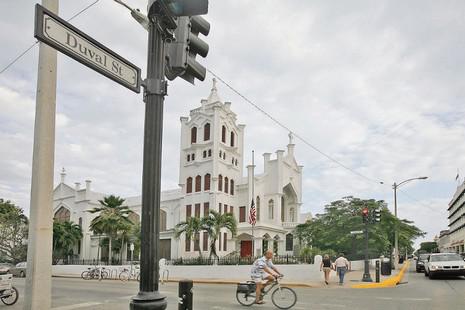|
'For every person baptized, the U.S. Church loses six Catholics'
By Céline Hoyeau
About 3,000 American Catholic Church officials are participating in a unique convention in Orlando, Florida, from July 1 to 4. The gathering is seen as an opportunity for the church leaders to reflect on how to spread the gospel and reach out to a country that is becoming secular. He may be at the helm of one of the most dynamic Roman Catholic parishes in Florida, with the 3,000 families present each weekend at one of the seven masses at Saint Peter’s Church in Deland, but Father Thomas Connery is still worried. “We have many retirees in Florida, so the churches are full but take them away and it’s a catastrophe,” says Father Connery. “We’re not managing to reach the young generations. "For every person baptized, the American church loses six Catholics," he laments. "We don’t dare talk about it among priests, doubtless because we do not know what to do, but it is past time to break this taboo. "Imagine a company facing such a problem. It would immediately launch an emergency plan! What about us?” U.S. bishops do not yet have an emergency plan, but they have organized a unique gathering. For the first time in a hundred years, priests, laymen, monks, nuns and other heads of services and movements from all over the United States have come together at a meeting in Orlando, Florida from 1 to 4 July. Their purpose is to reflect on how to be the best “missionary disciples”, in the words of Pope Francis in his Evangelii gaudium. The Evangelical Churches are attracting believers Catholics represent the largest denomination in the United States, with 77.4 million believers (22% of the total population), but fewer people have actually been attending church. The number of people taking the sacraments, except baptism, is also dropping. From 2013 to 2016, the number of children who had had their first communion decreased by 50,000 or 7%. Catholic schools registered a loss of 250,000 students over the same period. While the number of Catholics is on the rise, this increase is due to Hispanic immigration and “we don’t always manage to keep them", says Fr Connery. “Many turn to the evangelical churches, which give more scope for emotion, involve the faithful more, use music that is closer to modern culture.” If the Roman Catholic Church is losing ground in the United States, this also has to do with the rampant secularization of U.S. society in general. Americans who define themselves as not belonging to any religion, the “nones”, make up close to 25% of the population, up from 6% in 1991. This makes the "nones" the largest “religious group” in the country, according to a study by the Public Religion Research Center, published in September 2016. Reinventing communication “What I find interesting in this study are the reasons for this disaffection,” stresses Claire Henning, executive director of Parish Catalyst, an agency that provides leadership training for church leaders throughout the Americas. “Sixty percent no longer believe in the religious message, 66% think religion causes more problems than it creates solutions and 66% feel their children do not need religious education to have values. These are three assertions that we need to face and analyze.” She feels that the American Catholic Church has to start up a real culture change. “If we want to attract people who have moved away, we need to learn to look at things in a totally new way,” she says. “That also requires reinventing our communication, finding language that speaks to the young generations.” With this in mind, Fr Connery has set up Alpha courses in his parish. He wants the American Catholic Church to draw on the good ideas of the Evangelicals. “People want a personal relationship with God that makes sense, not rules or frameworks,” he says. “They need religion to have a concrete impact in their day-to-day lives.” “The beginnings of a dialogue” However, notes one observer, “a gap has developed between the institution, always powerful, rich, closed-in, and the base". "The American Catholic Church is quite dogmatic and on the defensive, an attitude inherited in particular from the child-abuse scandals." Broadly speaking, “there has been no place for doubt or debate in the American Church for years", says Claire Henning. “You couldn’t question anything, otherwise you could be described as a cafeteria Catholic”, in other words, someone who picks and chooses from the doctrine. The Parish Catalyst director says, however, that she can see “the beginnings of a dialogue”. “U.S. Catholics are starting to reflect, in a healthy way, on the reasons why they believe,” she notes. “We need this opening if we want to speak to a secularized society.” Bridges between Catholics The result of years of preparation, the Orlando Convocation, held under the theme of “The Joy of the Gospel”, alternates between plenary sessions and specific workshops on the challenges facing the American Catholic Church. These include the current political and cultural climate, the increasing number of non-religious persons, the impact of social networks, the needs and contributions of Latinos, racism and exclusion, reaching out to wounded families, and pastoral care for gay persons. At the US Conference of Catholic Bishops’ Autumn Assembly, Msgr Richard Malone, Bishop of Buffalo, New York, and head of the Conference’s Commission on Laity, Marriage, Family , nd Youth, stressed that the Convocation would be an opportunity to “build bridges” where the U.S. Church has been experiencing clear divisions, like U.S. society. It brings together participants from different sensitivities, such as pro-life and social-justice advocates, who are often at opposing ends of the American political and religious spectrum.
|
.
Any original material on these pages is copyright © BishopAccountability.org 2004. Reproduce freely with attribution.
